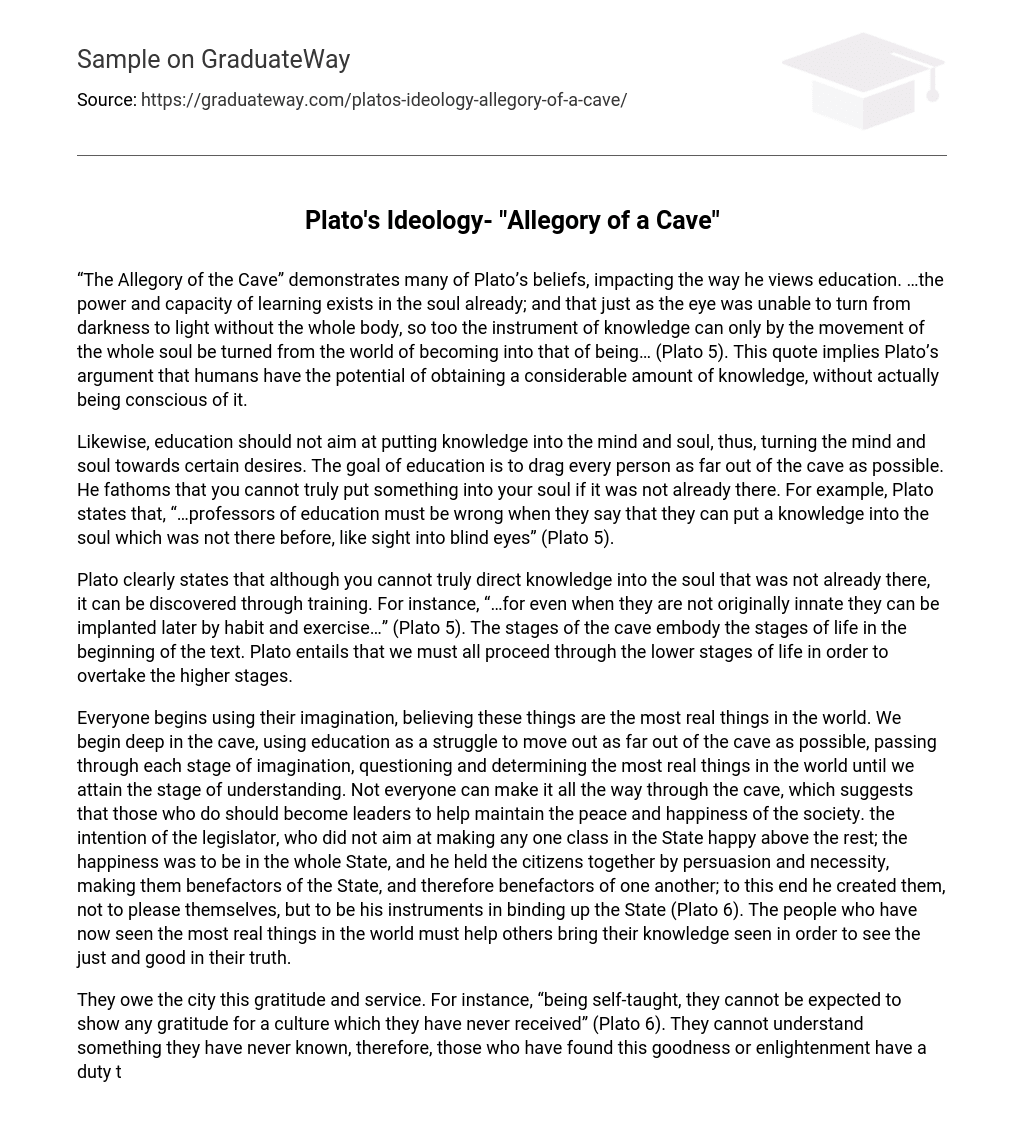“The Allegory of the Cave” demonstrates many of Plato’s beliefs, impacting the way he views education. …the power and capacity of learning exists in the soul already; and that just as the eye was unable to turn from darkness to light without the whole body, so too the instrument of knowledge can only by the movement of the whole soul be turned from the world of becoming into that of being… (Plato 5). This quote implies Plato’s argument that humans have the potential of obtaining a considerable amount of knowledge, without actually being conscious of it.
Likewise, education should not aim at putting knowledge into the mind and soul, thus, turning the mind and soul towards certain desires. The goal of education is to drag every person as far out of the cave as possible. He fathoms that you cannot truly put something into your soul if it was not already there. For example, Plato states that, “…professors of education must be wrong when they say that they can put a knowledge into the soul which was not there before, like sight into blind eyes” (Plato 5).
Plato clearly states that although you cannot truly direct knowledge into the soul that was not already there, it can be discovered through training. For instance, “…for even when they are not originally innate they can be implanted later by habit and exercise…” (Plato 5). The stages of the cave embody the stages of life in the beginning of the text. Plato entails that we must all proceed through the lower stages of life in order to overtake the higher stages.
Everyone begins using their imagination, believing these things are the most real things in the world. We begin deep in the cave, using education as a struggle to move out as far out of the cave as possible, passing through each stage of imagination, questioning and determining the most real things in the world until we attain the stage of understanding. Not everyone can make it all the way through the cave, which suggests that those who do should become leaders to help maintain the peace and happiness of the society. the intention of the legislator, who did not aim at making any one class in the State happy above the rest; the happiness was to be in the whole State, and he held the citizens together by persuasion and necessity, making them benefactors of the State, and therefore benefactors of one another; to this end he created them, not to please themselves, but to be his instruments in binding up the State (Plato 6). The people who have now seen the most real things in the world must help others bring their knowledge seen in order to see the just and good in their truth.
They owe the city this gratitude and service. For instance, “being self-taught, they cannot be expected to show any gratitude for a culture which they have never received” (Plato 6). They cannot understand something they have never known, therefore, those who have found this goodness or enlightenment have a duty to be responsible leaders to the others who do not share this enlightenment. “…they rule who are truly rich, not in silver or gold, but in virtue and wisdom, which are the true blessings of life” (Plato 6).
This quote for example, shows that Plato believes the ruler should be someone who is able to govern from truth and goodness. Whereas, if they think “that hence they are to snatch the chief good, order there can never be; for they will be fighting about office, and the civil and domestic broils which thus arise will be the run of the rulers themselves and of the whole State” (Plato 6). By thinking they can attain this knowledge, it can lead to corruption. The only good ruler rules out of a sense of duty and obligation, rather than a desire for power or personal gain.
In a sense, you need to understand everything to really understand anything. Plato implies that you have to work your way through the stages of your mind until you grasp and understand the most real things of the world. Until then, everything you believe is imaginative likewise, to the prisoners in the cave. Even though every human has the ability to obtain a substantial amount of knowledge, you have to turn your mind towards the right directions. Everyone has the knowledge, but has not discovered it yet.





